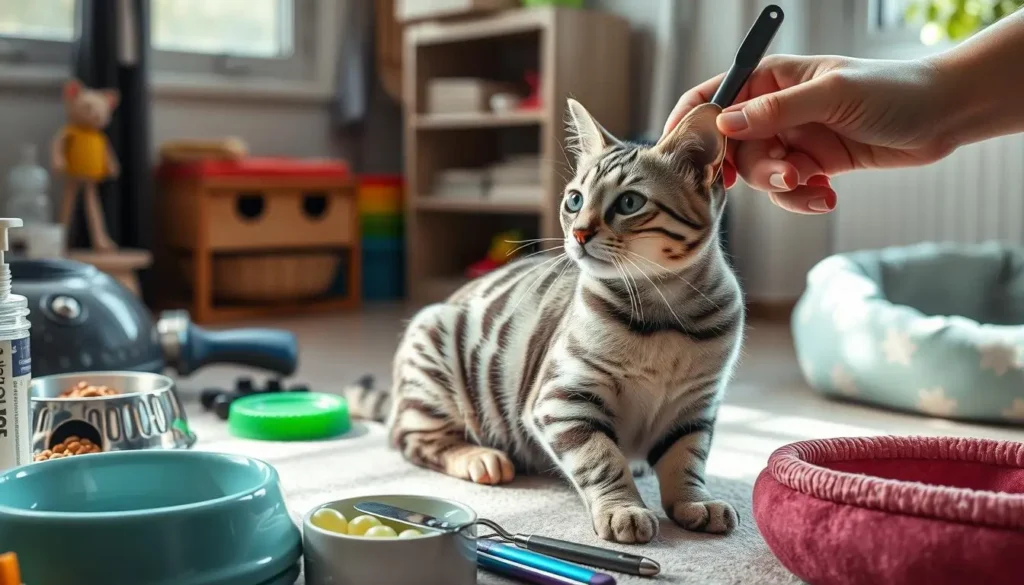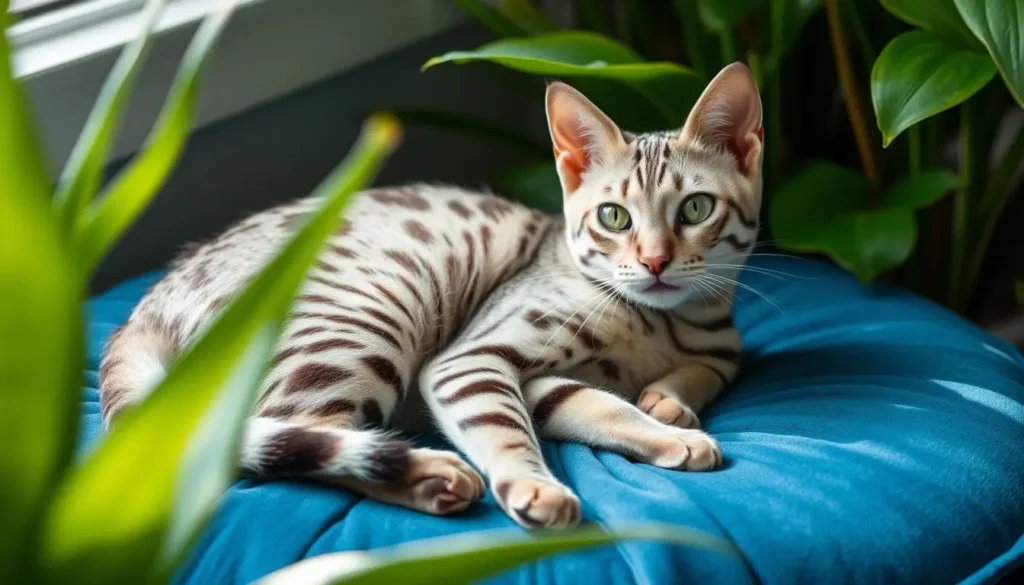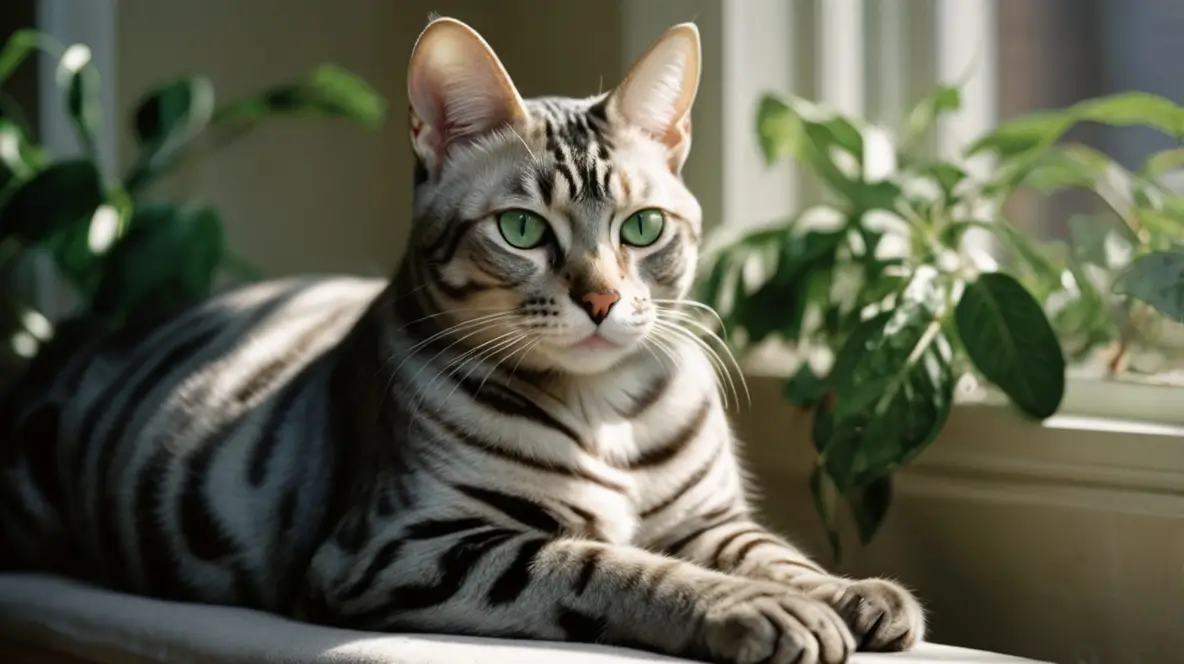Silver Bengal Cat: A Complete Guide To This Stunning Breed
Thinking about getting a new pet? The silver bengal cat might catch your eye. They have a beautiful silvery-gray coat and unique markings. This guide will help you learn about the silver bengal cat and how to care for one. We’ll cover their history, characteristics, and needs, including where to find reputable breeders.
Key Takeaways
- The silver bengal cat is a domestic breed with a silvery-gray coat and distinctive markings, making it a popular choice for those who want an exotic-looking pet.
- These cats are highly intelligent and energetic, requiring ample mental stimulation and exercise to prevent boredom and destructive behaviors.
- Proper nutrition is essential for silver bengal cats, with a balanced diet rich in protein necessary to maintain their health and well-being.
- Regular veterinary check-ups are crucial to monitor for common health issues, such as genetic conditions and dental problems.
- When choosing a silver bengal cat, it’s essential to select a reputable breeder who prioritizes health and ethical breeding standards, or consider adoption from a rescue organization dedicated to bengal cat breeders.
- Silver bengal cats are suitable for small families with plenty of space and experienced cat owners looking for a challenge, making them a great fit for those who are willing to provide the necessary care and attention.
- With an average cost of $10,000, silver bengal cats are a significant investment, but for many, their unique characteristics and loving nature make them well worth it.
Understanding the Silver Bengal Cat Breed
Exploring Silver Bengal cats reveals a breed with a fascinating history and special traits. The Silver Bengal cat breed started in the 1970s. Jean Mill, a breeder, mixed domestic cats with the wild Asian leopard cat. This mix created a distinct breed with striking silver bengal cat characteristics.
The rare silver bengal cat comes from careful breeding. Breeders focused on the silver coat color and its unique traits. The genetic makeup, especially the inhibitor gene, is key to their silver color. Learning about Silver Bengals reveals the genetic factors behind their stunning looks.
Origin and History
The Silver Bengal breed’s creation shows the hard work of dedicated breeders. They wanted to make a cat that stood out. The silver color was added to make the breed unique and beautiful, winning many cat lovers’ hearts.
Breed Recognition
The Silver Bengal breed is recognized by top cat associations, like The International Cat Association (TICA). Its unique looks and traits have made it a favorite among cat fans. As you learn more, you’ll see how breeders worked to get the breed recognized and loved.
Genetic Makeup
The Silver Bengal breed’s genetics are complex, with the inhibitor gene crucial for the silver color. Breeders have worked hard to keep the breed’s special traits. Exploring Silver Bengals teaches us about the genetics behind their stunning looks and rare silver bengal cat characteristics.
Distinctive Physical Features of Silver Bengals
The silver bengal cat has a luxurious, silvery background with dark spots or marbling. This gives them a striking, wild look. When you look into bengal cat breeders, you’ll see Silver Bengals stand out. They have an athletic build, large paws, and a sleek frame. This makes them very agile, able to climb and play easily.
One of the Silver Bengal’s most distinctive features is the black “M” shape on their forehead and eye markings. These markings vary but always add to their striking look. Silver Bengals are medium-sized, with a height of 13 – 16 inches and a weight of 8 – 17 lbs. They are perfect for many families, being both loyal companions and energetic playmates.
Silver Bengals come in various coat patterns, including silver, brown spotted, and more. This variety is why many are drawn to the breed. Their unique physical features and stunning coat patterns make them a favorite among cat lovers.
Some key features of the Silver Bengal include:
- Athletic build and large paws
- Sleek frame and agile movement
- Distinctive black “M” shape on the forehead
- Markings around the eyes that vary in intensity and pattern
- A variety of coat patterns, including silver, brown spotted, and more
The Unique Silver Bengal Coat Pattern
The silver Bengal coat pattern is truly unique. It has a silvery background with dark spots or marbling. If you’re looking for a silver bengal kitten for sale, knowing about their coat is key. The silver color comes from a special gene that affects melanin, giving a white base with black or dark gray patterns.
The silver bengal cat characteristics include various patterns like rosettes, spots, and marbling. These patterns cover the cat’s body, making it visually stunning. Some silver Bengals might also have a “tarnish” effect, showing brown tones on their face and feet.
Bengal cats come in many colors, like brown, snow, and charcoal. But the silver coat pattern is especially sought after. This makes silver bengal kitten for sale very popular among cat lovers. Knowing about the silver Bengal coat pattern helps you choose the right pet.
Silver Bengal Cat Temperament and Personality
Silver Bengal cats are known for being curious, energetic, and playful. Breeders often point out these traits as key. They are smart and loving, making them perfect for active families.
Some key aspects of the silver bengal cat temperament include:
- High energy levels, requiring regular play and exercise
- Intelligence and curiosity, making them prone to exploration and interaction
- Affectionate and social, but also valuing their independence
- Playful and energetic, with a love for interactive toys and games
Understanding a silver bengal cat’s temperament is crucial before bringing one home. Working with reputable breeders and providing the right care can help your cat thrive. This way, they’ll become a cherished family member.
Silver Bengal cats are a favorite among cat lovers for their unique mix of energy, smarts, and love. Knowing their temperament helps you decide if they’re the right fit for you.
| Trait | Rating |
|---|---|
| Intelligence | 5/5 |
| Affectionate | 4/5 |
| Playfulness | 5/5 |
Health Considerations for Silver Bengal Cats
If you’re thinking about getting a silver bengal cat, knowing about their health is key. These cats are usually healthy but can face some genetic problems. Issues like hypertrophic cardiomyopathy and hip dysplasia might occur. Regular vet visits and tests, like cardiac ultrasounds, can spot these early.
Common health problems include progressive retinal atrophy, urinary tract issues, and allergies. Feeding them a balanced diet with lots of moisture can help with urinary tract problems. Also, removing allergens can ease allergy symptoms. The rare silver bengal cat needs extra health care because of its special genetics. This can impact the silver bengal cat price.
Keeping your silver bengal cat healthy means regular care. This includes vaccinations, deworming, and preventing fleas and ticks. A good diet and lots of playtime are also important. By picking a trustworthy breeder and caring for your cat, it can live a long, happy life. On average, they live 12-16 years.
- Regular veterinary check-ups and screenings
- Balanced diet rich in moisture
- Identification and removal of allergens
- Vaccinations, deworming, and flea/tick prevention
- Plenty of exercise, such as interactive play
| Health Issue | Description | Prevention |
|---|---|---|
| Hypertrophic Cardiomyopathy | A genetic heart condition | Regular cardiac ultrasounds |
| Progressive Retinal Atrophy | A genetic eye disorder | Early DNA testing |
| Urinary Tract Issues | Bladder stones and infections | Balanced diet rich in moisture |
Daily Care Requirements
As a silver bengal cat owner, you’ll want to give your pet the best care. This means regular grooming, feeding, and keeping the litter box clean. Proper care is key to your cat’s health and happiness.
Silver bengal cats need brushing and nail trimming to avoid coat problems. Talking to reputable bengal cat breeders can help with grooming tips. A well-groomed cat looks great and feels better too.
Here are some daily care tips to remember:
- Feed your silver bengal cat a high-quality diet
- Make sure they always have fresh water
- Clean the litter box often to keep them healthy
- Play and socialize with your cat every day
By following these tips, your silver bengal cat will be happy and healthy. For more care advice, reach out to experienced bengal cat breeders.

Exercise and Environmental Needs
Thinking about getting a silver bengal kitten? It’s key to know their exercise and environmental needs. These cats are full of energy and smart, needing lots of play and stimulation. This helps prevent boredom and bad behavior.
Silver bengal cats need different toys and activities to stay interested. They enjoy interactive toys, scratching posts, and even going for walks on a leash. It’s smart to have more than one scratching post for each cat. This lets them scratch naturally and behave well.
Playtime Requirements
- Interactive toys to stimulate mental and physical activity
- Scratching posts to provide an outlet for natural scratching instincts
- Leash training for walks or adventures
Indoor vs Outdoor Living
Silver bengal cats do well indoors and outdoors, but safety is key. Indoors, they need lots of space to play and exercise. Outdoors, they must be watched closely to avoid escape or injury.
Essential Equipment
To keep your silver bengal cat safe and happy, get some important gear. This includes:
| Equipment | Description |
|---|---|
| Scratching posts | Provide an outlet for natural scratching instincts |
| Interactive toys | Stimulate mental and physical activity |
| Leash and harness | Allow for safe outdoor adventures |
Knowing what your silver bengal cat needs helps make a great home for them. This way, they can be happy and healthy.
Nutrition and Feeding Guidelines
As a rare silver bengal cat owner, it’s key to feed them right. They need high-quality protein like chicken, turkey, and fish. The price of a silver bengal cat can change based on their lineage, age, and health. But, a good diet is crucial for their health.
Choosing the right food for your silver bengal cat is important. Many cat foods have too many carbs and plants, which can cause obesity and diabetes. A Prey Model Raw (PMR) diet is better. It has 80% meat, 10% bone, and 10% organs, just like their natural diet.
For high-quality food, consider Raw Delivery MN, Viva Raw, and Hare Today for raw options. ZIWI Peak Air-Dried Cat Food is also a good choice. Adding NuVet Plus Feline Powder can help fill nutritional gaps. Always switch your cat’s food slowly over 7 to 10 days to avoid stomach problems.
By giving your silver bengal cat a natural, high-protein diet and supplements, you support their health. A good diet is vital for their overall health. With the right food, your rare silver bengal cat can live a happy life.
| Food Supplier | Food Type |
|---|---|
| Raw Delivery MN | Raw Food |
| Viva Raw | Raw Food |
| Hare Today | Raw Food |
| ZIWI Peak | Air-Dried Food |
Finding Reputable Silver Bengal Cat Breeders
When looking for a silver bengal cat breeder, focus on the cats’ health and happiness. Good breeders offer a clean, safe place for kittens to grow. Start by researching and reading reviews from others.
Good breeders focus on socializing kittens. They make sure kittens meet many people and experience different things. They also share health information, like genetic tests. For example, Vengalicat Bengals in the Greater Seattle area tests for PK-Deficiency and PRA-B, and screens for HCM.
What to Look For
- Health guarantees and genetic testing
- Transparency about the breeding process and kitten socialization
- Positive reviews and testimonials from previous buyers
- A clean and safe environment for the kittens
Researching and finding a reputable breeder ensures a healthy, social kitten. Ask lots of questions and trust your instincts. If something doesn’t feel right, it’s okay to leave.

Questions to Ask
- What health guarantees do you offer?
- Can I visit your facility and meet the kittens and their parents?
- What kind of socialization do you provide for the kittens?
- Do you have any references from previous buyers?
Asking the right questions helps you find a reputable breeder. This way, you can bring home a happy, healthy silver bengal cat.
| Breeder | Location | Health Guarantees |
|---|---|---|
| Vengalicat Bengals | Greater Seattle area | PK-Deficiency, PRA-B, and HCM screening |
Understanding Silver Bengal Cat Prices
Thinking about getting a silver bengal cat? It’s key to know the costs. Prices vary based on location, breeder, and bloodline. On average, expect to pay between $1,500 and $3,000 for a silver bengal cat. Some rare ones might cost over $5,000.
Spaying/neutering costs $100 to $200, and microchipping is $50 to $75. Monthly expenses like food and litter can be $50 to $100. Preventative vet care adds another $50 to $100 monthly.
Breaking Down the Costs
- Initial purchase cost: $1,500 to $3,000
- Spaying/neutering: $100 to $200
- Microchipping: $50 to $75
- Monthly food and litter costs: $50 to $100
- Monthly preventative vet care: $50 to $100
Pet insurance costs $5 to $40 monthly. With the right care, your silver bengal cat can live 10 to 15 years. Knowing the costs helps you give your pet the best life.
| Cost Category | Estimated Cost |
|---|---|
| Initial Purchase | $1,500 to $3,000 |
| Monthly Expenses | $50 to $100 |
| Pet Insurance | $5 to $40 |
Training Your Silver Bengal
As a Silver Bengal cat owner, you know they’re smart and full of energy. The right training can make your bond stronger. It’s key to understand the silver bengal cat temperament for a good training plan. When picking a cat from bengal cat breeders, ask about their personality to match your lifestyle.
Training a Silver Bengal cat needs patience, consistency, and positive feedback. Here are some tips to start:
- Make training sessions brief and enjoyable to prevent overwhelming your cat.
- Focus on one type of training at a time, such as housebreaking or basic commands.
- Use rewards, such as treats and praise, to encourage good behavior.
By putting time and effort into training, you can improve your Silver Bengal cat’s silver bengal cat temperament and social skills. This makes them a great companion. Always choose reputable bengal cat breeders who care about their cats’ health and well-being.
With the right training, you can unlock your Silver Bengal cat’s full potential. Enjoy a rewarding relationship with your pet.
| Training Tip | Description |
|---|---|
| Positive Reinforcement | Use rewards, such as treats and praise, to encourage good behavior. |
| Consistency | Establish a regular training schedule to help your cat learn and adapt. |
| Patient Approach | Take your time and be patient with your cat, as they may need time to learn and understand new commands. |
Conclusion: Is a Silver Bengal Cat Right for You?
The silver bengal cat is a stunning and unique feline companion. They have captivating coat patterns, energetic personalities, and need an active lifestyle. These cats can make wonderful pets for the right owner. But, it’s important to think if a silver bengal cat fits your lifestyle and expectations.
If you’re an experienced cat owner, a silver bengal cat might be perfect for you. They are smart, inquisitive, and flourish with mental stimulation. They will form a strong bond with their dedicated owners. But, they have high activity levels and need specialized care.
However, if you’re a first-time cat owner or prefer a low-maintenance pet, a silver bengal cat might not be the best choice. Their energetic nature and grooming needs can be challenging. Their high prey drive also poses a risk to small pets or children.
Deciding to welcome a silver bengal cat into your home should be made carefully. Consider your lifestyle, experience, and ability to meet their unique needs. With the right preparation and commitment, these captivating felines can bring endless joy and companionship to their loving owners.

